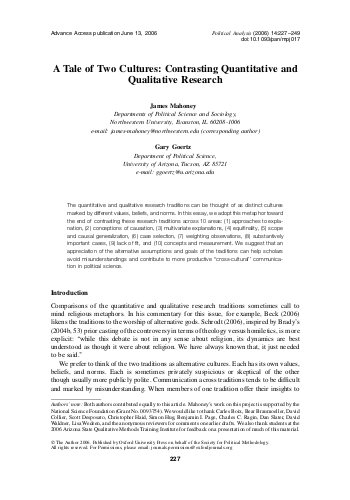
The quantitative and qualitative research traditions can be thought of as distinct cultures marked by different values, beliefs, and norms. In this essay, we adopt this metaphor toward the end of contrasting these research traditions across 10 areas: (1) approaches to explanation, (2) conceptions of causation, (3) multivariate explanations, (4) equifinality, (5) scope and causal generalization, (6) case selection, (7) weighting observations, (8) substantively important cases, (9) lack of fit, and (10) concepts and measurement. We suggest that an appreciation of the alternative assumptions and goals of the traditions can help scholars avoid misunderstandings and contribute to more productive ‘‘cross-cultural’’ communication in political science.